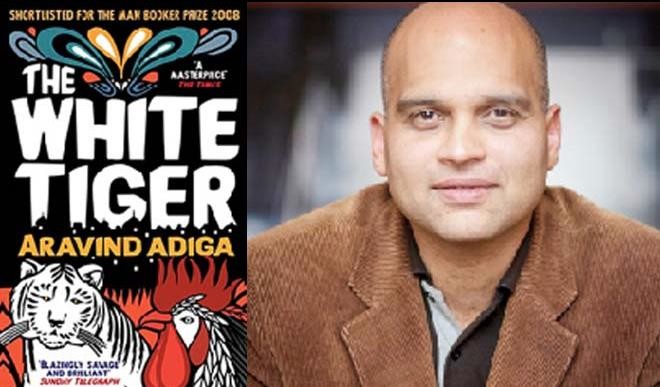
The Booker prize-winning author on the challenge of following early success and capturing the new India
At the age of just 33 in 2008 Aravind Adiga won the Booker prize for his first novel, The White Tiger. It was career-making, but also – as becomes clear in the course of our conversation – potentially career-breaking. Milestones can also be millstones. How do you follow that?
His latest novel, Selection Day, the story of two cricketing brothers from the slums of Mumbai trying to achieve their ultra-pushy father’s dream of superstardom, took Adiga five years to write. It was a slog; there were times he thought he’d never finish it. And as we talk the reason becomes clear: he was trying both to explore something personal in his own upbringing, in which achieving academic success had crowded out the needs of childhood, and to exorcise his Booker demons.
“The White Tiger didn’t just win the Booker, it was a bestseller,” says Adiga. “I had come out of complete obscurity, and at first I found it hard to deal with the fact I was a published writer. Once you have written a book like The White Tiger it’s very hard to escape from the shadow of it. I was frightened the White Tiger would eat me up too.”
The year after winning the prize, Adiga published a set of linked short stories called Between the Assassinations. They had been written before the novel and many were set in Mangalore, the coastal town in south-west India in which he had grown up. In 2011 he produced Last Man in Tower, a state-of-the-nation novel in which one righteous man, the long-time resident of a crumbling Mumbai tower block, stands up against the developers and gentrifiers, representatives of the money-obsessed new India trying to wipe away the old.
Last Man in Tower was well received, but didn’t have the impact or sales of his first book, which had told the story of the new India through the other end of the telescope, letting its amoral central character Balram Halwai, the son of an impoverished rickshaw puller, offer an extended justification for the murder of his employer. The killing had allowed Balram to escape from the darkness of poverty into the light of prosperity; so what that it cost the life of his well-meaning if corrupt boss and led to his own family being wiped out in the ensuing vendetta? In India’s new entrepreneurial age, the means justified the end. That message was controversial in India, but wannabe entrepreneurs in its burgeoning middle class still felt the need to buy the book to find out what the fuss was about.
The White Tiger was short, sharp, fast-paced, visceral and perfectly timed – winning the Booker in the midst of the global financial crisis of 2007-08 when worshipping the god of money had led us all to hell. The tone of Last Man in Tower was more considered, the canvas wider, the cast more sprawling.
“I had a big anxiety about what to do next,” Adiga admits. “You can never please the people who like The White Tiger. It was written in a certain way, at a certain time, and I don’t want to do that again. I asked myself where I would go from there; how could I keep growing as a writer? I’m very grateful I won because it’s kept me alive as a writer – it’s tough surviving as a writer of fiction in India – but it has been a challenge to escape from The White Tiger.”
He sees Selection Day as a very different book – more autobiographical, more reflective, more subtle in its critique of Indian capitalism and corruption – and part of the process of unhooking the tiger’s claws. The two brothers, Manju and Radha, and their cricketing rival Javed face a fundamental question: do they give their lives to cricket, which would please their fathers, or do they give their lives to … well, to life.
Radha is wedded to the search for cricketing success; Javed, gay and a Muslim (a dual outsider in Indian society), is intent on living freely, an admirable aim made easier by the fact he is from a wealthy background; Manju is conflicted: not just about cricket and whether to devote himself to it, but about his sexuality. His attraction to Javed is central to the book. Which life does he choose? You hope for a successful, conventional conclusion to their love story, but dreams don’t always work out. At least they don’t in Adiga’s clear-eyed, hard-edged view of the world.
The Indian arm of Netflix has this month announced it is turning Selection Day into a TV series, and it will be interesting to see how the bleak coda to the book is treated. Comedy and tragedy are conjoined in Adiga’s fiction, as in India itself, and finding the right tone on TV will be far from easy.
The lives of the two brothers echo Adiga’s own, though in his case with the emphasis on academic success rather than cricketing prowess. He has a brother, five years older, and both were high flyers, outstanding students in their home state of Karnataka. The pressure to succeed was huge. His background is usually described as prosperous – his father was a surgeon. Indeed, some have questioned his right to write about the lives of the Indian poor given his supposedly privileged upbringing. But he portrays it differently.
His mother, who died of cancer when he was 15 (absent mothers are a theme, as in Selection Day, where the brothers’ mother has long fled their challenging father), was from a wealthy background, and felt she had come down in the world. She was concerned with keeping up appearances – creating a false picture of family prosperity was useful training in writing fictions, says Adiga – and the success of her sons was instrumental in achieving that.
After his mother’s death, his father emigrated to Australia, where Adiga completed his schooling. His brother headed for the US, where he became a banker, while Adiga went on to study English literature at Columbia University in New York and at Oxford. His earliest passion was 19th-century French literature, Émile Zola in particular, a “literature of defeat” (in contrast to the self-confidence of 19th-century British fiction), which spoke to a young man in a country that, he says, had spent centuries being defeated.
Adiga assumed he would become an academic and after his MPhil at Oxford went to Princeton, but he panicked at the prospect of another six years studying and became a journalist instead, first for the Financial Times, then as South Asia correspondent of Time magazine. But in his heart he knew he would never be a career journalist, quitting Time after three years to go freelance.
“Being a journalist afforded me a path to go back to India,” he explains. “Journalism was a way of supporting myself and of forcing myself to meet and talk to people I knew I wouldn’t meet otherwise. I was gathering material to become the kind of writer I wanted to be. I had no idea how long this would take – potentially for ever. I assumed I’d have to keep working as a freelance or as a staff journalist somewhere, but I’d grown up in India and I knew I could live without money. I still feel that. It’s a tremendous resource at the back of my mind. If I lose everything, I know how to live on nothing.”
Adiga’s journalistic training underpins his novels. For Selection Day he did a great deal of research on the current state of the sport and interviewed young cricketers. It produces portraits of great depth and verisimilitude. I ask him whether the comedy – the pushy father, the world-weary entrepreneur who sponsors the two boys in the hope he can eventually cash in on their success – is satirical, but he says mostly he just writes what he sees. “The facts are always more interesting than the ones I can invent,” he says.
Adiga has chosen to base himself in India – first in Mumbai, now in Bangalore, the hi-tech hub of south India. Indian writers of a previous generation tended to relocate to London or New York, but he says he was a bad exile. “I have to be in India to be writing about India.” He cites a line from VS Naipaul: “The truth about India is not what you think, but what they are living.”
Adiga says he relies on research because he is determined to be truthful. “I want to make sure I’m not being excessively negative [about modern India],” he explains. “I have a real sense of anxiety about this. I have old socialist nerves in a capitalist country, and that can make me excessively critical.”
“Old socialist nerves” might seem odd in a man who is still only 42, but Adiga points out that he grew up in the old, socialist India and has come of age as a writer in the new, dynamic, entrepreneurial one. All four of his books to date explore the conflicts and contradictions inherent in the transition from one to the other since economic liberalisation began in 1991.
He recoils when I describe him as a “social realist”, complaining the term makes him sound boring, but he accepts it to some degree. What he stresses, though, is that social realism, the examination of a society at a moment of fundamental change, can be exciting. “For me, macroeconomics is like sex. Social change is as intense, as passionate a subject. I don’t see it as an abstract thing. It has a sort of erotic fascination or I wouldn’t be writing about it. These never strike me as dry subjects. It was the same with the heroes of my childhood, Maupassant and Zola. Zola is often accused of being more interested in processes than people, and it is a danger you fall into, but nevertheless the body of work he’s created is vital, tremendous.”
He is now working on a novel set in Australia, where he lived for three years, but is also gathering material for another book based on life in Mangalore – one reason he moved back to India. The great thing about being able to live on very little and having no dependants – indeed no family in India, which he says is how he likes it – is that he can follow his impulses. Anything is possible. Or nothing. “I wasn’t sure with each book whether it would be my last and I’m still not entirely sure,” he says, “and I don’t think you should be.” Writing remains a source of excitement and mystery for Adiga.
Will he ever escape the clutches of the tiger? “The White Tiger is the book I’ll be remembered for,” he says. Surely he has to aim to top it, I protest. “I’m not sure that can be done,” he says matter-of-factly. He cites Robert Frost’s poem “Birches”: “I’d like to get away from earth awhile / And then come back to it and begin over.” How nice it would have been, he sometimes thinks, just to have been shortlisted: recognition without excessive attention. But then he recalls the next lines of the poem: “May not fate wilfully misunderstand me / And half grant what I wish and snatch me away / Not to return.” What if he hadn’t even been shortlisted? The tiger may cast a shadow, but better that than never being exposed to the sun.
• Aravind Adiga’s Selection Day is published in paperback by Picador
Source: Theguardian.com




